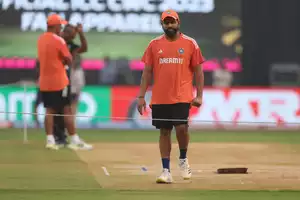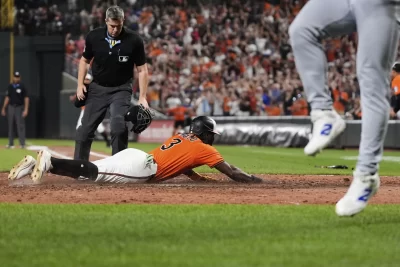
There’s a theory about ‘the shushhh’ that precedes the start of a pre-match India press conference. It is when the conversational hum in the room quickly gives way to a collective call for silence as soon as the player or coach addressing the media steps in. The louder the ‘the shushh’, the higher the grade of the cricketer that has stepped in or greater the significance of the match he or she is about to preview, or both.
‘The shushh’ that accompanied Rohit Sharma deep in the bowels of the Wankhede Stadium on Tuesday (November 14) felt significant. Events at The Oval, Old Trafford, Rose Bowl, Adelaide Oval and The Oval again have left India without a knockout game victory at an ICC event for six years now. Perhaps it had to do with that feeling of a cycle having been completed. Or maybe it had to with Rohit’s team having been particularly dominant in this home World Cup. Or quite simply it being the Diwali week, there was an unavoidable air of ceremony when Rohit spoke ahead of the semifinal.
The India captain has come a long way in the art of public speaking and this was in many ways a faultless, likable and engaging performance that even when not particularly revealing in its details during many stretches of its 25-something minute runtime, it was consistently coherent, breezy in tenor and yet diplomatic. For example, Rohit sidestepped a question about this being the most dominant World Cup squad of his time but offered a peek into his captaincy vision.
“I just believe that as a captain, if you have decided that this is how you want to play as a team, then there needs to be clarity amongst the team,” he said. “And then if a certain player wants to go out there and play in the way that you want him to play, then you’ve got to back that player to the hilt. And that is what we’ve done.
“We’ve backed certain players because we’ve given them a different role. And if they perform the role, well and good, but even if they don’t, which will not come off in every game, we have got to back that player and tell him that we stand by you. That is something that I believe in and I want to do it as much as I can from my side and I’ve also got to give credit to Rahul bhai [Dravid] as well you know to buy into that thought of not changing too much when the player doesn’t come off with that plan.”
He detailed the efforts of the team management in helping to defuse the nervous tension that is bound to grip a high profile team like India in a home World Cup campaign like this, but was quick to add that the methods used weren’t revolutionarily different to previous regimes.
“We started in Australia in the last World Cup, we started there the same way. We reached Australia 10 or 15 days early. And we had set up a small camp in Perth for seven or eight days. There is an island near Perth, we went there. We went away from cricket. Wherever we get a chance, we try to do activities like that. To keep the team’s environment light. It’s not like it’s only happening in the last two years. It used to happen before as well. But now, I don’t know. I don’t know if it’s more visible now.”
Rohit revealed that efforts to keep the camp in the best spirits was brought forward to this World Cup campaign, where after the first set of five league games, the squad and its support staff had a Rest & Recreation session in Dharamsala. This included a fashion show, details about which he wasn’t forthcoming with. “Our conscious effort has been on this, that the team’s environment does not change based on the results,” he said.
“We have to create the environment that is needed for the team and that is mandatory. And this cannot be done by one or two boys. It is important for all the boys to come together, including the support staff. So, like we were in Dharamsala, we had a five or six-day break there. We stayed in Dharamsala for two days. We did a lot of team activity there. We did a fashion show there, but no one knows about that. It’s a good thing that no one knows about it.”
Conversation often veered back and forth between the past and the immediate future. Rohit paid compliments to the New Zealand team, calling them ‘most disciplined’ and ‘smart’ and acknowledged that players knew at the back of their minds what happened four years ago at the same stage and that there was no running away from history.
For an Indian captain, who is evaluated only based on the end result, tournaments like this can seem all consuming. It was important, he said, to switch off when not on the field. “I have a family with me, so my mind goes here and there, which is a very good thing,” he said. “When I go to my hotel room, we completely stay away from cricket. We discuss a lot of other things. It’s a good thing. You think a lot about cricket, yes, but when you have time, when you have a chance to not think, then you shouldn’t think. Because, even if you think all day, what will happen? So it is important to think about something else.”
What Rohit didn’t want to think about, at least in the confines of this conference room and at this juncture of the tournament, was his own legacy. While he was more open with an answer to a similar question in Chennai at the start of the World Cup, he didn’t indulge in the narrative arc of growing up as a cricketer at the Wankhede Stadium to now captaining the country here in a World Cup semifinal.
“I don’t think there’s so much time to think about it. The focus is on the game, what we have in hand tomorrow. I seriously have no time to think about my journey, what it has been in the past. Probably after 19 November I will think about it. Right now, it is just business and pure business of getting the job done for the team.”
And shortly thereafter he left, to oversee his teammates’ preparation in the nets, to take another reading of the Wankhede pitch that he believed couldn’t be bracketed after four games, to run his hands through the outfield for evidence of dew and finally to roll his arm over to the left-handed Kuldeep Yadav. And then he and his team were gone. There was no place for any more shushing now.






